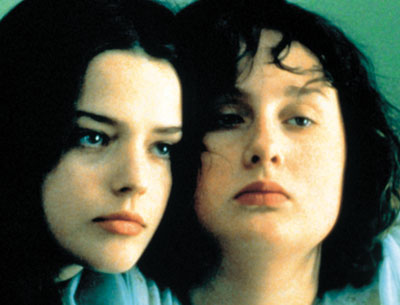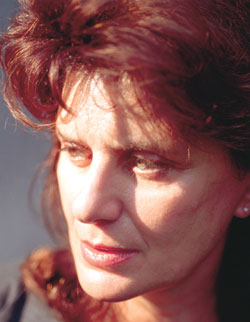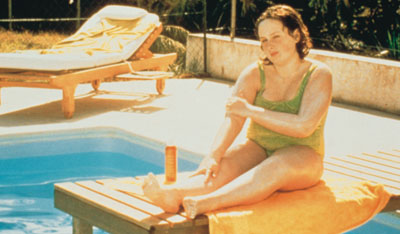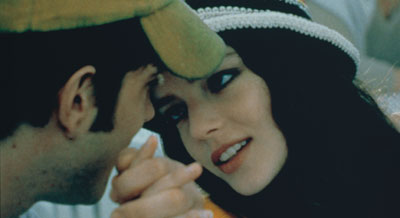END OF INNOCENCE
More appropriately titled Á Ma Soeur! in the director’s native France, Fat Girl is Catherine Breillat’s brilliant and shocking follow-up to Romance. B. Ruby Rich talks with the director about her genre-morphing ode to sibling rivalry and adolescent desire.
 |
| Roxane Mesquida and Anaïs Reboux in Fat Girl. Photo: Hervé Lafont and Jonathan Kruger. |
The celebrated French writer/director Catherine Breillat (Romance, 36 Fillette) was pleased. She was at the Telluride Film Festival to receive a tribute and award for her filmmaking career (eight feature films and 13 screenplays), and she was happy to be there, explaining that Telluride honors mean a lot in France. Her new film, Fat Girl (Á Ma Soeur!) was showing there, along with an exceptionally fine reel of clips culled from her very auteurist career, then heading out to be screened at the Toronto and New York festivals.
Fat Girl is a tour-de-force, a sexual drama that pulls no punches and insists on sticking to the uncorrupted truth. It’s framed as a summertime tale of love, hate and competition between two young sisters — one pre-adolescent and one about to take the plunge into womanhood. Breillat daringly chose actresses nearly the same age as the film’s protagonists to play the parts. It’s an unusually frank coming-of-age drama about girls confronting the nature of sexuality, desire and power. The film is directly sexual without the porn legibility of Romance, but is possibly more emotionally biting.
The biggest shock comes at the end, when violence unexpectedly intervenes. Yet the meaning of the violence is monumentally ambiguous (a quality Breillat loves), challenging the audience to rethink its own moral judgments. Don’t think for a minute, however, that Breillat engineers her films merely to shock. “I never think about the audience,” she argues. “I have to make my films for myself.” Luckily, nobody thinks like Breillat. Her films, though made for herself, will likely astound us for years to come.
Racing back to Paris before Toronto began and, afterward, starting production on her next film, Brief Crossing, in November, Breillat managed to take some time out for an interview. Even though the interview ran past its appointed time into a dinner (thank you, Cowboy Pictures) that seated, among others, the talented new Argentine director, Lucrecia Martel (La Ciénaga), Breillat, as always, had a lot to say — all of it interesting.
 |
| Catherine Breillat. Photo: Miguel Villalobos. |
B. RUBY RICH: Why did your film’s title change for the U.S. from Á Ma Soeur! to Fat Girl?
CATHERINE BREILLAT: Actually, I named the film Fat Girl originally, and it was I who made the change. When I was shooting and discussing the film in interviews in every newspaper in France, it was always Fat Girl. Just a few days before the opening, I thought maybe I should retitle it. I didn’t think the description of her weight was a problem, because she’s so beautiful and so at ease in her own body. But I thought, it’s the story of two bodies — two sisters — not just one. So I wanted to change the title. But it had already sold to Germany as Fat Girl and now to the U.S. I don’t know if it’s a good title here, because I don’t speak very much English.
[Note: Much of this interview was conducted in English, so judge for yourself.]
RICH: Where did the ideas for your script originate?
BREILLAT: Well, it’s strange. I first thought of making this movie when I saw a scene that was exactly the same as the one in my film: a little girl in a hotel swimming pool, moving back and forth talking to herself as if speaking words of love to imaginary boys. It was in Taormina, in Sicily, when I was there for the film festival. I could not invent such a scene. I just changed the song: the girl I saw in the pool was Italian, and she was singing Francoise Hardy’s song, “Tous Les Garçons.” I changed it to a song about a crow that I wrote when I was 12 or 13, inspired by Francois Villon’s “La ballade des pendus.”
It was so strange to see this girl, who was so sexual and pure — and so big also, so young and so strong — that I knew it was the beginning of a movie. I could not forget this scene, and I worked and worked on a synopsis with the title Fat Girl. Then, I remembered a tabloid news story I had read 20 years earlier about a young girl — a girl between childhood and adolescence — who was raped. The newspaper that reported the story said that the little girl had saved her own life, while others were killed, because she understood that if she accepted rape she would not be harmed. And I thought, what if I combine these two into one girl?
RICH: That idea was popularized in the U.S. as well, some years ago — that women are not supposed to fight back against rape because that leads to their being killed. It was a whole ideology I suspect was organized against the women’s self-defense classes of the time: Let them rape you, and you will live.
BREILLAT: Yes, true. But as she was so young, the newspaper told this story both from a politically correct point of view and also in such a way as to give you a sensational feeling of sexuality, to sell papers. This hypocrisy was something very horrible to me. I thought, what if the young girl who was raped was the same young girl that’s in the swimming pool? I could end the film with someone saying to the audience, “This is not a rape.” By that, she is saying: “I have never been raped, because nobody can rape my mind; you don’t have to worry about me.”
For me, the initial rape is that of the virginity of the young girl, the sister, who does not get to own her own virginity. Society wants to know if a young girl is a virgin or not. I think that is a rape. The older sister is the real rape in the film because she is in a position where you have to combine sentimentality with the physical act. This kind of sexual act is very normal, but she feels the boy must be the love of her life. It’s just a summer love, but she thinks it’s not normal, not normal enough. We give so much emphasis to the sexual acts of a young girl that she wants him to tell her lies. When she agrees to have sex with him, she agrees because she thinks it’s love. But she’s really accepting this rationale because of his lies. I think this is mental rape, the worst rape — because it’s a rape in which the woman gives up her self-esteem, a rape that does not even show up as a rape, because everyone lives like that — lives for romatic love. That’s why I say that Fat Girl is like a sitcom. It’s completely ridiculous that we live for lies. Actually, it’s not ridiculous, it’s not funny. It’s terrible. I say it’s like a sitcom, but since I go into the truth of sentimental emotion, in that way it isn’t really like one. It is more tragic and more comic. You have to think about it.
RICH: The casting is remarkable. Is it true that you found Anaïs Reboux, who plays the pre-teen character named Anaïs, in a McDonald’s?
BREILLAT: Yes. She was eating.
RICH: And she was only 13?
BREILLAT: Yes.
RICH: And you found out that she [was] working on a novel — just as you had as a teenager?
BREILLAT: It’s true. But this nearly didn’t happen. I was told her first screen test was terrible. I insisted on doing another because it turned out that the original casting director didn’t know how to handle her. So I re-tested her, and she was terrific.
 |
| Anaïs Reboux. Photo: Hervé Lafont and Jonathan Kruger. |
RICH: How did you discover Roxane Mesquida, who plays her older sister Elena?
BREILLAT: It’s a strange story. Roxane sent her photograph to the casting director, but he was very sure that she was not right for me. He thought she looked like a sitcom actress. But I always saw this movie as a psychological sitcom! So I wanted her. [But] he told her I wasn’t going to make the movie after all, and he tried to put her on a TV sitcom in France. I was already very prejudiced against this casting director because of [my experience with casting] Anaïs. My first assistant director, who is a very diligent and sensitive person, saw Roxane’s photograph, followed up and contacted her. So I dismissed the casting director, and I cast Roxane as Elena.
Everyone was surprised that I cast a girl who was 17 because, on my earlier film, 36 Fillette, I cast a girl who was only 15. It became a huge problem. If she had not had her 16th birthday three days before we started production, I would not have been able to show the movie around the world — because it is against the law to show explicit images of a girl who is not yet 16 in many countries.
RICH: She turned 16 just before you shot?
BREILLAT: Three days before! It was a miracle, because when I cast her I had never asked her age, or her birthday. I promised my producer, Jean-François Lepetit, that this time I would cast a girl older than 16 — but then I only saw girls who were 14 or 15. I told him, “Don’t worry, I have to see girls who are the real age,” because I didn’t want to take a girl who was too old for the character — I have to tell the truth. “But I would cast a girl who was 16 or older in the end.” Suddenly, Roxane entered and she looked the right age and I said, without knowing her age at all, “If she plays it well, you can stop casting, I’ll take her.” The minute I saw her, I knew. She looks like Romy Schneider, whom I adore. Roxane is obviously beautiful, but she’s not the kind of girl that’s in fashion today with a big pouty mouth. She’s a little out of fashion.
I did some tests with her that required her to improvise, and she improvised very well. But it’s not the same as having to learn a text and my scripts are very “written.” I had to know if she’d be able to learn the lines. She was coming overnight on the train. Just as she was leaving, I gave her another text to learn — a scene from The Mother and the Whore by Jean Eustache.
RICH: I love that film. It is so unfairly forgotten.
BREILLAT: Exactly. If you give a person this Jean Eustache text, which is so sexual, then they know what it’s all about, and I wouldn’t need to explain that about my own film. She did it so beautifully. She was so courageous. And she was so innocent and very sexual. But so poetic at the same time. She could say these words to the camera, at the same time blushing with shame. For a young girl, she was just marvelous. And then, to the producer’s joy, I found out she was actually 17. She looks younger because she’d been raised in Provence, not Paris, by a May ’68 hippie mother who protected her from popular culture. As a result, she’s like a girl from another time.
RICH: Why did you make the character of Fernando, the boy with whom Elena falls in love, an Italian?
BREILLAT: Because Italians have such a beautiful accent in French! Also because I don’t like French men. For you Americans, Frenchmen on screen are like Latin lovers.
RICH: Not for me.
BREILLAT: For me, French actors are just umbrellas. Now it’s the fashion for French actors to be very ugly and very frigid. They are so constipated. When you see an Italian man, he talks with his body. He’s lively and well, like the songs say, it’s a lie but you want to believe it. I think Italian actors have a sort of sensuality that French actors do not. We used to have actors like Alain Delon who were beautiful. But now? Gerard Depardieu and the others like him are monsters.
RICH: The lover in Romance then, who is impotent and frigid, reflects your opinion of the French actors?
BREILLAT: Here is the problem with the French masculine actor: You can shoot them with big close-ups, but if you ask them to cross the space and go from this point to that point, you see they are awful when it comes to the body. They cannot act with their body because they feel so bad in it. And this is terrible, because man is a body, nothing else.
 |
| Libero De Rienzo and Roxane Mesquida. Photo: Hervé Lafont and Jonathan Kruger. |
RICH: So you have Italian lovers then?
BREILLAT: No, because they are liars! They are better for fiction than for reality.
RICH: Well, it did give you a reason to cast Laura Betti, the great Pasolini actress, who plays his social-climbing mother.
BREILLAT: Yes, I love Laura Betti. That’s also her — younger of course — on the television that Elena and Fernando are watching.
RICH: I have to ask you another irresistible autobiographical question: Do you have a sister? And are you the younger one?
BREILLAT: Yes. And my sister is very beautiful. In fact, she was an actress when she was younger and played the part of Colette’s Claudine. Now she just lives her life and doesn’t act any longer. I guess I was the one that really wanted to play with cinema, write movies, make movies. I’m the one that kept doing it.
RICH: Given what you just said about your theme of the first love of summer, do you see your film as being in any kind of dialogue with the whole Nouvelle Vague tradition? I am thinking of something like Rohmer’s Pauline at the Beach that so idealizes the first love that is beloved by this earlier generation of French filmmakers. It’s an attitude that you essentially dismantle here.
BREILLAT: France is the country of dialogue between desire and sentiments.
RICH: Sentiments meaning emotion?
BREILLAT: Yes. It’s a French tradition to analyze. We have a very specific analysis of emotion and sentimentality. And I think Rohmer is in this French tradition. I am working in another way because I am more interested in ambiguity. But I am also in revolt, because I am a woman who was once a young girl. For instance, in between the first scene of the girl in the swimming pool and the last scene taken from the tabloid, I had to imagine. And I have no imagination — so I drew upon my own life, on the relation between my sister and me when we were young.
But I think also that everybody lives the same life. I think that every young girl goes to the café during the summer on holiday like the sisters do in Á Ma Soeur! to find their first love. Similarly, the antagonism and complicity between two sisters is always like this. Many girls have already told me: “This is my story with my sister.” So, it’s my story, but it’s everyone’s story. I shot a very simple story, but it’s everybody’s story. I believe that it is in these simple stories that we reveal ourselves the most, and also hide the most. We think that if something is so ordinary and banal we should not even speak of it but, on the contrary, I think it’s a veil that hides so much.
RICH: Were you bored as a girl, like Anaïs?
BREILLAT: No, I wasn’t bored. If you are angry at the world, you can invent a great inner life for yourself. Of course, I was not a normal little girl. I read all the children’s books, then I went on to adult books. The Marquis de Sade, for example. When I was 10 or eleven, we studied Rabelais in school and I noticed that the text was completely censored, all the ribald phrases were removed. So I challenged the teacher about why the section on venereal disease was missing, but she insisted that Rabelais was just spiritual, that I was talking about metaphor. That’s why I opened my first novel (L’Homme facile, written when she was 17 and published in 1968) with a completely pornographic quotation from Rabelais.
RICH: What do you consider the grand themes of your films?
BREILLAT: I always return to the young girl as the central figure in cinema. And to the ongoing antagonism between romanticism and desire. There’s always a kitsch, humorous aspect to the young girl. I think that Fat Girl is very funny. Violent, yes, but funny. I suppose that desire, guilt, romance and anti-romance (which are the same thing) are my constant subjects.
VOD CALENDAR


 See the VOD Calendar →
See the VOD Calendar →


